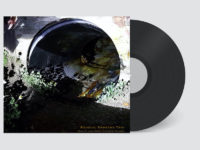photo courtesy of Rounder Records
Sometimes music is about hearing two masters of their craft jam together, amazing listeners with their sheer artistry. That summarizes Across The Imaginary Divide, a collaboration with banjo maestro Béla Fleck and the Marcus Roberts Trio. Also featuring bassist Rodney Jordan and drummer Jason Marsalis (youngest of the Marsalis jazz dynasty), the album dazzles with Fleck and Roberts’ lightning-fast playing. Yet Across The Imaginary Divide is about more than speed—it’s about two superior musicians both complementing each other yet inspiring the other to even greater heights.
The opening track “Some Roads Lead Home” features rapid tempo changes as well as Roberts’ deft piano work perfectly matching Fleck’s intricate banjo picking. Once again Fleck proves how he has single-handedly transformed the banjo into a rhythmic instrument as well as a solo one. Jordan’s bass truly shines on this track. Yet he plays jazzy solos on “I’m Gonna Tell You This Story One More Time” as Roberts, Jordan, and Marsalis provide a lazy swing background that showcases Fleck’s obvious affection for straight-ahead jazz.
[SOMETHING ELSE! INTERVIEW: Marcus Roberts talks about his return to the jazz landscape after an eleven year absence with the release of his album New Orleans Meets Harlem, Vol. 1.]
Across the Imaginary Divide may be best characterized by the Fleck-penned title track, a cut that challenges Fleck and Roberts to meld their distinctive styles. What results is a flurry of piano and banjo at dizzying tempos, with Jordan’s astounding bass playing anchoring the rhythm. “Let Me Show You What to Do” features Roberts’ structured playing, an amalgamation of his classical and jazz training, which transitions effortlessly between tempos and moods, from unabashedly romantic to bop. The uptempo “Petunia,” co-written by Fleck and Roberts, bears traces of country with a touch of New Orleans-style piano. Marsalis’ furious drum work impresses, as does what sounds like a friendly competition between the two lead musicians, each driving on the other to play harder.
Other highlights include the Latin-tinged “Topaika,” where Roberts and Fleck prove why each are masters of their instruments, their solos intertwining and imitating the other’s style. Roberts’ gift for improvisation shines on this track, as it does on the Roberts-penned “Let’s Go.” Fleck’s “That Old Thing” allows him to demonstrate why he is widely considered a truly gifted musician (and that Roberts is a brave man to play alongside such an outstanding artist). Indeed, the two trade solos as Marsalis expertly handles the difficult tempo.
While the final track may be called “Ragtime Feeling,” do not expect a straightforward ragtime piano tune. Yes, Roberts at times pounds the piano, but the unusual tempo and Fleck’s swinging banjo suggest that the song represents their particular slant on the genre. Perhaps that technique exemplifies the mission of Across the Imaginary Divide—while some may not immediately pair Roberts and Fleck, their musical differences are actually slight. Not only can they work together, they have composed material that effectively highlights their unique talents.
Fans of both artists will enjoy Across The Imaginary Divide, a work that should mark only the first in a series of collaborations between Fleck and Roberts. The two inspire each other to transcend their genres and create technically and emotionally superior jazz. Here’s hoping we will see more projects from this duo in the future.
[amazon_enhanced asin=”B007TKBEJ0″ /] [amazon_enhanced asin=”B004S699GI” /] [amazon_enhanced asin=”B00005YUNL” /] [amazon_enhanced asin=”B000002ASE” /] [amazon_enhanced asin=”B000002C17″ /]
- The Rescued Early Paul McCartney Song That Completed ‘Beatles For Sale’ - December 4, 2024
- A Rare Beatles Cover Proves John Lennon Was Wrong About His Voice - November 26, 2024
- How John Lennon Came Roaring Back on the Beatles’ White Album - November 22, 2023



